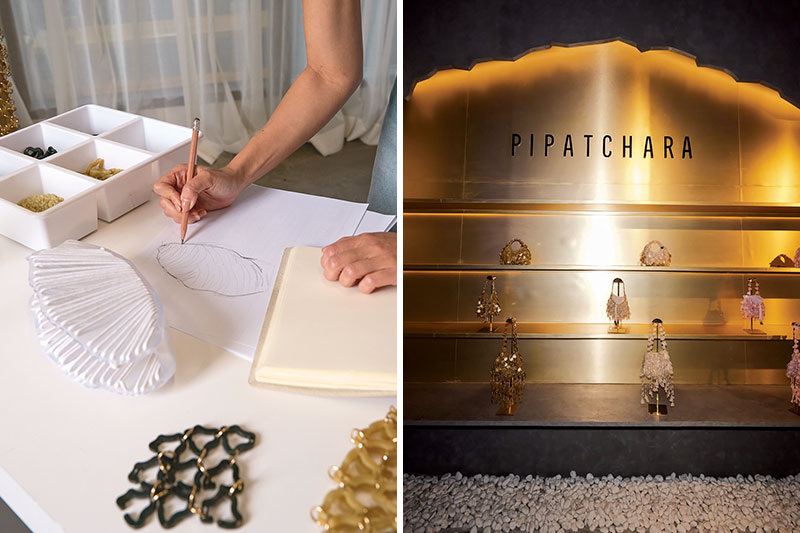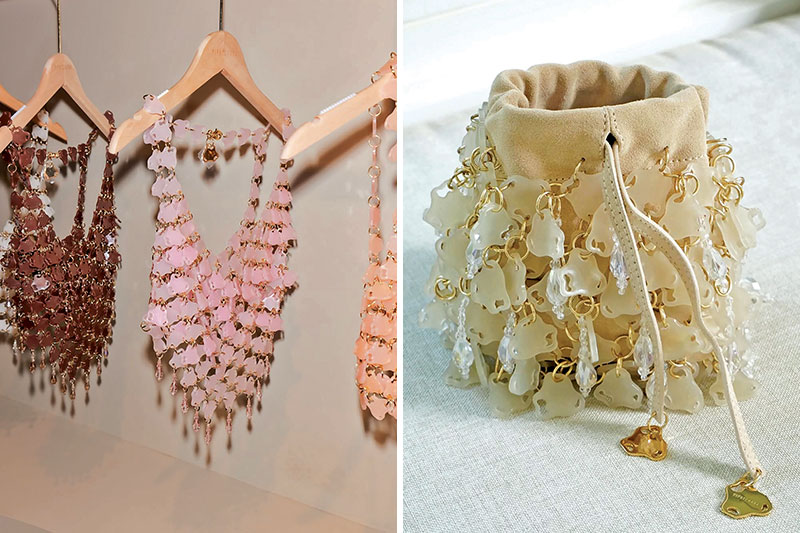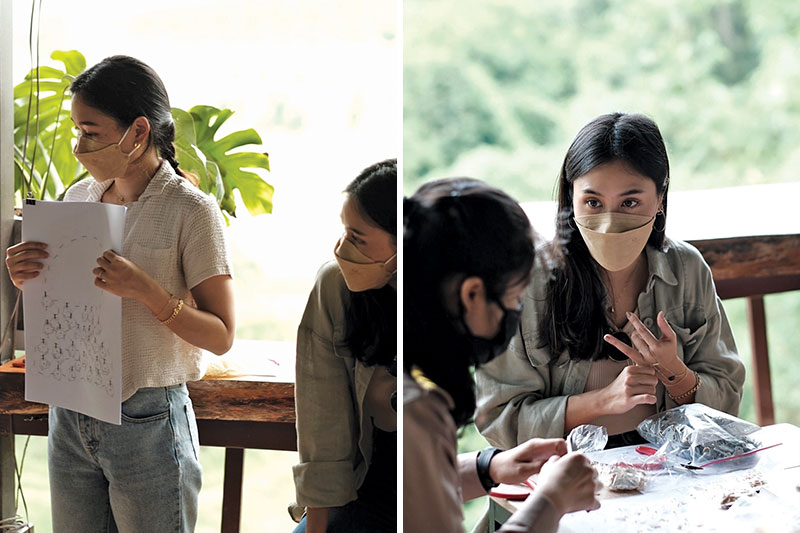
Net Gains
Thai fashion house Pipatchara transforms deadly ocean waste into world-class fashion, redefining style through sustainability
Words: Phoowadon Duangmee
Photos: Pipatchara
Standing at the crossroads of couture and environmental activism, Bangkok-based fashion house Pipatchara is weaving marine waste into high-end design. Founded by sisters Pipatchara “Petch” Kaeojinda, a fashion designer, and Jittrinee “Tuptim” Kaeoinda, a sustainability specialist, the brand is not only transforming wardrobes – it is challenging the very notion of what fashion should be, and why it matters.
Already a fixture on the global fashion circuit – showcasing in Paris, New York, Dubai and London – Pipatchara grabbed the spotlight when BLACKPINK’s Lisa (Lalisa Manobal) appeared at the 2024 Formula 1 Monaco Grand Prix in a bespoke shimmering two-piece. The stunning outfit, crafted from over 1,800 pieces of recycled plastic – 80% from used bottle caps and 20% from food containers – embodied the label’s cutting-edge vision and ecological conscience.
But behind the couture glamour lies a serious mission – one that goes far beyond token eco totes.

The brand’s sustainability journey began with its infinitude collection, which transformed discarded plastic caps into sculptural geometric fashion. Far more than a mere line of clothing, it was a manifesto – sewn with intention and community spirit.
Now, the Jabel is venturing further offshore. With Aqua R Us, Pipatchara turns its focus on the ocean’s most insidious pollutant: discarded fishing nets. Deadly to marine life and notoriously slow to degrade, these “ghost nets” are reborn as luxury fashion items – part of a growing movement to reclaim waste and lend it lasting value.
Launching on July 4 at Underwater World, Siam Paragon, the Aqua R Us collection will debut 40 new looks, including garments, handbags, shoes, hair clips and other accessories.
“Also, we have curated an exhibition that tells the story of how old fishing gear is transformed into fashion items – explaining why we chose to combine discarded nets with high-end fashion,” says Pipatchara, whose résumé includes stints with global brands like Ralph Lauren, Vanessa Bruno and Givenchy.

Made primarily from nylon, fishing nets can take up to 600 years to degrade. Their environmental toll is immense – from entangling sea turtles and dolphins to shedding microplastics that contaminate the food chain. Recognising this, Pipatchara partnered with UBE, a major nylon manufacturer, and Bangkok Airways to create a system for retrieving and recycling these materials.
“It’s not just about using recycled materials,” adds Pipatchara. “It’s about long-term commitment to the communities we work with.”
For the past three years, Pipatchara has collaborated with communities in Northern Thailand to foster sustainable livelihoods, strengthening these efforts through Aqua R Us. Fishing villages along the Gulf of Thailand help by collecting and sorting nets. Designers and researchers engage directly with locals, learning the nuances of materials and lifecycles.
With Bangkok Airways’ help, the team visited remote coastal areas to witness firsthand how quickly nets become waste – often discarded after just four or five months of use.
What followed was innovation on every front.

One major hurdle? Colour. Recycled nylon, in its raw form, yields only black – a constraint for any designer – let alone a fashion designer. Rather than dilute the material with virgin plastic, Pipatchara worked with UBE scientists for nearly two years to develop a fully recycled, colour-friendly nylon. the result: a palette of rich hues with broad application potential – from fashion and furniture to automotive parts.
Though recycled nets are no longer good for fishing due to degradation, they remain a valuable plastic. Pipatchara is teaching local communities how to craft design items from the material, aiming for a truly circular system – local nets, local labour, global visibility.
“This is very high-qualtiy plastic,” says Pipatchara. “It just needs the right application.”
The goal of Aqua R Us is not just to dazzle on the runway – it’s to spark conversation. Sculptural handbags, architectural silhouettes, and modern accessories showcase the power of creative reuse. Each piece defies expectation: you’d never guess its origins lie in the ocean.
“The final product doesn’t look like a fishing net at all,” she adds. That’s the pride of Pipatchara – turning something harmful into something desirable.
With Aqua R Us, Pipatchara delivers a powerful message: fashion must be part of the solution. By refusing shortcuts and focusing solely on 100% recycled materials, the label redefines what it means to be truly sustainable.
“This isn’t just about fashion,” says Pipatchara. “It’s about showing other industries what’s possible. If more people start using this kind of recycled material, we can change the whole system.”
Indeed, Aqua R Us is more than a collection – it’s a movement. A call to action. A stitch-by-stitch demonstration of how creativity and design can drive change when rooted in care, community, and courage.

From Ghost Nets to Living Luxury
- Discarded fishing nets are made from nylon plastic, which can take up to 600 years to degrade.
- These “ghost nets” often trap and kill turtles, dolphins, fish and other marine animals.
- Coastal economies suffer when these nets litter tourism beaches or harm coral reefs.
- Recycling fishing nets into usable products diverts waste away from oceans and empowers local communities.
